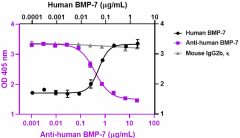- Clone
- A17135E (See other available formats)
- Regulatory Status
- RUO
- Isotype
- Mouse IgG2b, κ
- Ave. Rating
- Submit a Review

| Cat # | Size | Price | Quantity Check Availability | Save | ||
|---|---|---|---|---|---|---|
| 946904 | 1 mg | 1205 CHF | ||||
| 946903 | 100 µg | 358 CHF | ||||
Bone morphogenetic proteins (BMPs) belong to the transforming growth factor beta (TGF-β) superfamily. BMPs play a key role in embryonic development, especially during heart, neural and cartilage development. Around 20 BMP family members have been identified and characterized. BMPs signal through serine/threonine kinase receptors, and are composed of type I and II subtypes. Four type I receptors have been identified: type IA and IB BMP receptors, type IA activin receptor, and activin receptor-like kinase I. Three type II receptors have also been recognized: type II BMP receptor and type II and IIB activin receptors. BMP-7, originally identified by its properties to induce bone formation, has been identified as an anti-fibrotic molecule, antagonizing TGF-β1. Fibrosis is associated with the emergence of fibroblasts derived from endothelial cells, suggesting an endothelial-mesenchymal transition (EndMT). TGF-β1 induces endothelial cells to undergo EndMT, whereas bone BMP-7 preserved the endothelial phenotype. BMP-7 inhibits fibrosis in the kidney, lung, liver, heart, peritonium, oral submucosa tissue, and colonic wall.
Product DetailsProduct Details
- Verified Reactivity
- Human
- Antibody Type
- Monoclonal
- Host Species
- Mouse
- Immunogen
- Recombinant human BMP-7
- Formulation
- 0.2 µm filtered in phosphate-buffered solution, pH 7.2, containing no preservative.
- Endotoxin Level
- Less than 0.01 EU/µg of the protein (< 0.001 ng/µg of the protein) as determined by the LAL test.
- Preparation
- The Ultra-LEAF™ (Low Endotoxin, Azide-Free) antibody was purified by affinity chromatography.
- Concentration
- The antibody is bottled at the concentration indicated on the vial, typically between 2 mg/mL and 3 mg/mL. Older lots may have also been bottled at 1 mg/mL. To obtain lot-specific concentration and expiration, please enter the lot number in our Certificate of Analysis online tool.
- Storage & Handling
- The antibody solution should be stored undiluted between 2°C and 8°C. This Ultra-LEAF™ solution contains no preservative; handle under aseptic conditions.
- Application
-
Block - Quality tested
- Recommended Usage
-
Each lot of this antibody is quality control tested by neutralization of differentiation induced by recombinant human BMP-7 (Cat. No. 595602) at 0.2 µg/mL on ATDC5 mouse chondrogenic cells. ND50 range: 0.3-1.5 µg/mL. It is recommended that the reagent be titrated for optimal performance for each application.
- RRID
-
AB_2894547 (BioLegend Cat. No. 946904)
AB_2894547 (BioLegend Cat. No. 946903)
Antigen Details
- Structure
- Growth factor, homodimer
- Distribution
-
Widely expressed
- Function
- BMP-7 promotes bone formation; BMP-7 induces Langerhans cell differentiation and proliferation, induces brown adipocyte differentiation and thermogenesis, and it has antifibrotic properties.
- Interaction
- Osteoblasts, Langerhans cells, adipocytes, endothelial cells
- Ligand/Receptor
- BMP type-I receptor ALK3 and Type II BMP receptor
- Cell Type
- Embryonic Stem Cells, Hematopoietic stem and progenitors, Mesenchymal Stem Cells, Neural Stem Cells
- Biology Area
- Angiogenesis, Apoptosis/Tumor Suppressors/Cell Death, Cell Biology, Neuroscience, Stem Cells, Synaptic Biology
- Molecular Family
- Cytokine/Chemokine Receptors, Growth Factors, Tumor Suppressors
- Antigen References
-
- Chen D, et al. 2004. Growth Factors 22:233.
- Tseng Y, et al. 2008. Nature 454:1000.
- Zeisberg E, et al. 2007. Nat. Med. 13:952.
- Hao ZM, et al. 2012. Mol. Ther. 20:2043.
- Yasmin N, et al. 2013. J. Exp. Med. 210:2597.
- Gene ID
- 655 View all products for this Gene ID
- UniProt
- View information about BMP-7 on UniProt.org
Related FAQs
- Do you guarantee that your antibodies are totally pathogen free?
-
BioLegend does not test for pathogens in-house aside from the GoInVivo™ product line. However, upon request, this can be tested on a custom basis with an outside, independent laboratory.
- Does BioLegend test each Ultra-LEAF™ antibody by functional assay?
-
No, BioLegend does not test Ultra-LEAF™ antibodies by functional assays unless otherwise indicated. Due to the possible complexities and variations of uses of biofunctional antibodies in different assays and because of the large product portfolio, BioLegend does not currently perform functional assays as a routine QC for the antibodies. However, we do provide references in which the antibodies were used for functional assays and we do perform QC to verify the specificity and quality of the antibody based on our strict specification criteria.
- Does BioLegend test each Ultra-LEAF™ antibody for potential pathogens?
-
No, BioLegend does not test for pathogens in-house unless otherwise indicated. However, we can recommend an outside vendor to perform this testing as needed.
- Have you tested this Ultra-LEAF™ antibody for in vivo or in vitro applications?
-
We don't test our antibodies for in vivo or in vitro applications unless otherwise indicated. Depending on the product, the TDS may describe literature supporting usage of a particular product for bioassay. It may be best to further consult the literature to find clone specific information.
Other Formats
View All BMP-7 Reagents Request Custom Conjugation| Description | Clone | Applications |
|---|---|---|
| Ultra-LEAF™ Purified anti-human BMP-7 Antibody | A17135E | Neut |
Compare Data Across All Formats
This data display is provided for general comparisons between formats.
Your actual data may vary due to variations in samples, target cells, instruments and their settings, staining conditions, and other factors.
If you need assistance with selecting the best format contact our expert technical support team.
-
Ultra-LEAF™ Purified anti-human BMP-7 Antibody

Recombinant human BMP-7 (Cat. No. 595602) (black circles) in...

 Login / Register
Login / Register 












Follow Us